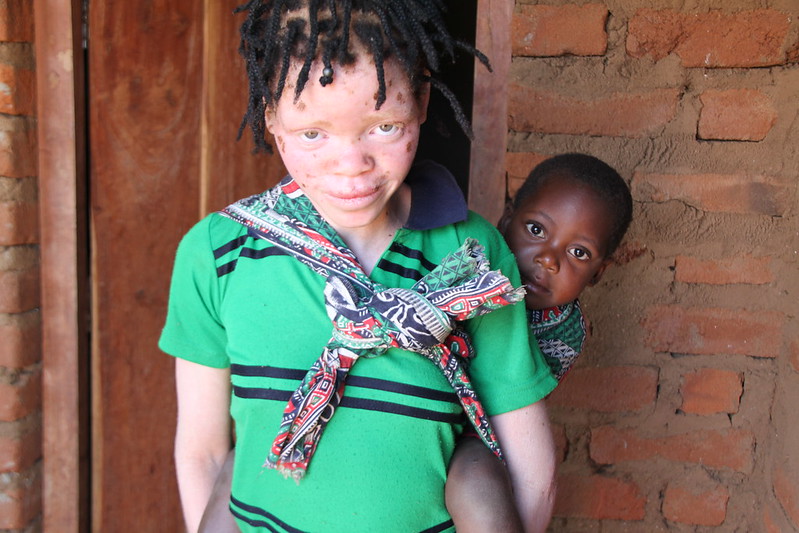
Ana Paulino with her younger brother.
Changara, Tete province, Mozambique
August 2012
Every child has the right to participate in an inclusive and non discriminatory education. There are, however, places where prejudice and stigma still stand in the way of many students, sometimes, these customs are enforced by their own parents.
When 14-year-old Ana Paulino started school at EPC Armando Guebuza School, she did not expect to take part in many activities — especially not in gym class. “I was used to sitting in a corner and waiting until class was over. I was forbidden to touch the other children,” she explains.
Ana joined Grade 6 at EPC Armando Guebuza when she and her parents moved to Changara, Tete province, about a year ago. When her parents came to register her in school, they did not mention that she and one of her younger sisters suffer from albinism; they also did not know that the school was part of the Child-Friendly Schools initiative, which promotes inclusive education and the right of all children — especially girls, children with disabilities, orphans and vulnerable children — to equitable education.
“When she started coming to school,” explains school Health Focal Point Frasia Joao Baptista, “we knew that we had to make her feel welcome and ensure that she participated in all activities.” In her previous school, Ana was not allowed to do sports, or anything else that would put her into close contact with other children. “They were afraid of me,” she recounts, “so the teacher always told me to sit away from the rest.”
Ana had gotten used to staying apart from other children, and Ms. Baptista had to convince her to participate. “I would find lighter activities for her that I knew she could handle; she needs to move like the other children, and be a part of the group!” The other children were initially afraid, or perhaps curious, as Ana started to take part in gym class. “I did not feel different once I started doing sports. I just felt like it was the normal thing to do,” Ana says, pointing out how natural it was for her to be a part of the group.
“Many of my classmates like me now, they are not afraid anymore,” she says with a glint in her eyes. Ana invites us to her home, where she lives with her parents and four siblings. She shows us the daily work she usually does: in the morning she goes to fetch water, and she shows us how she then mills and refines corn seeds. “She helps out a lot at home,” her father says. “Ana is a very good daughter.”
The other day, Ana’s father came to school to watch his daughter play sports. “We have realized that Ana can do almost everything. And she is good at playing football too!” he says proudly. Ana feels very much a part of her class now. A boy in the front row shouts, “Ana, come here!” Ana goes and sits next to him, ready for her teacher to start the lesson.
Published in the UNICEF Publication: Child-Friendly Schools – Stories from Mozambique & on the UNICEF Mozambique website
Photos & Text © UNICEF Mozambique/2012/Caroline Bach

Life for albinos in Mozambique is an ongoing struggle against discrimination, ridicule and many cultural challenges. Unlike in some other African countries, however, it isn’t life threatening, and it was very common to see albinos in the street, with common jobs and dancing in the nightclubs in Maputo. I had the opportunity to talk to a couple of individuals suffering from albinism, and they said that generally, people are kind – and some even consider them to be good luck. When I showed my photos of Ana Paulino and her family to some Mozambican acquaintances, they exclaimed: “Wow, they got two albino girls, what a blessed family!”
However, with eyes and skin extremely sensitive to sunlight, and difficulties in affording the expensive high-factor sunscreen and sunglasses for protection, life with albinism is anything but a blessing. Not to mention the skin cancer and many visual problems that these people have to endure.
Ana was a shy, but calm and happy, girl. She took care of her younger siblings with the maturity of an adult woman despite being only 14 years old, and spoke about her past as if being excluded from gym class had been as obvious and normal as the fact that she no longer wasn’t. It was never a big deal for her then, she said, she just simply wasn’t allowed to touch anybody or participate because she was different. Today, she can not imagine going back to the corner.
It was very interesting to hear her tell her own story, as we so often assume that people miss what they don’t have. In this case, even the intervention of her new teacher was met with reluctance. That’s right. Ana didn’t want to participate in gym class in the beginning. Because everybody was looking at her.
Which is what makes this case, and other cases like it, particularily important. People with disabilities, women in sexist societies, children living in contexts that don’t respect their right to an identity, protection, freedom or play.
People don’t always miss what they don’t have, instead, much too often – they convince themselves that they aren’t entitled to it.

what a great story – awesome and sad all at the same time.